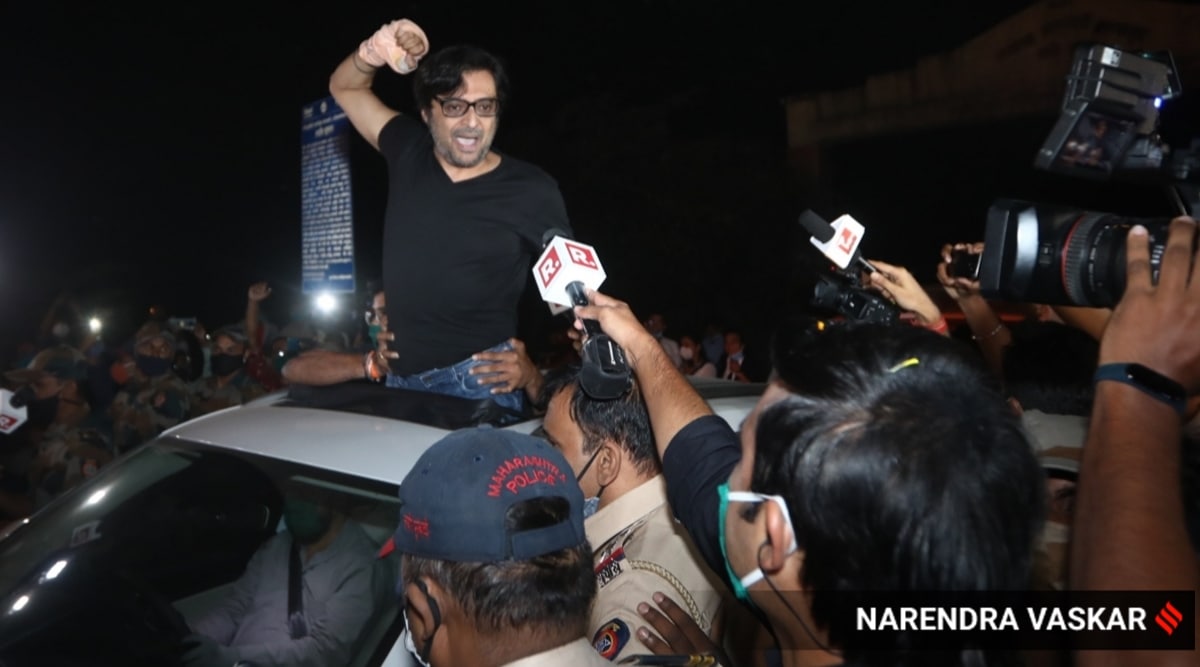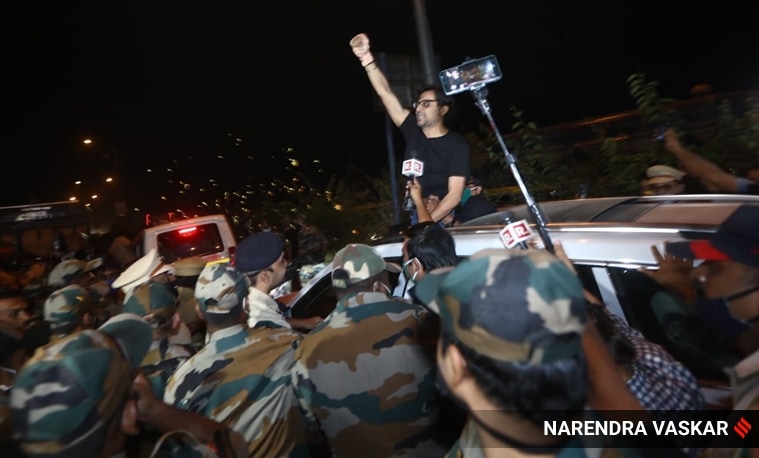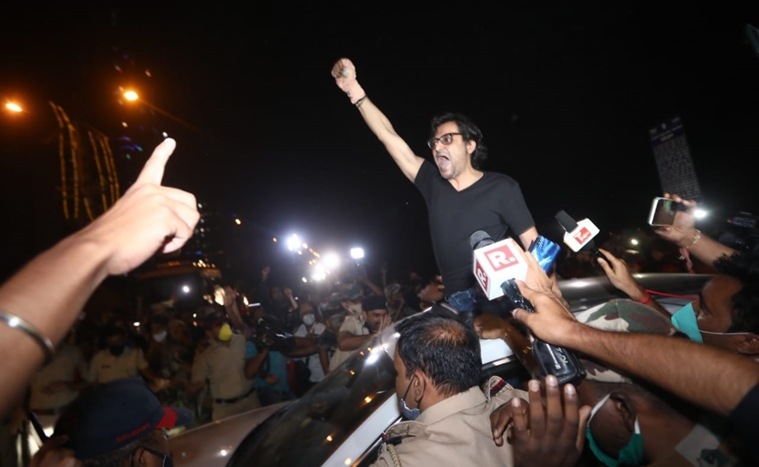 Republic TV Editor-in-Chief Arnab Goswami was released from Taloja Central Prison on Wednesday. (Express photo by Narendra Vaskar)
Republic TV Editor-in-Chief Arnab Goswami was released from Taloja Central Prison on Wednesday. (Express photo by Narendra Vaskar)Stating that the Bombay High Court “was in error” in rejecting the interim bail applications of Republic TV editor-in-chief Arnab Goswami and two others arrested in an alleged abetment to suicide case, the Supreme Court Wednesday granted them interim bail amid objections from the Maharashtra government.
Goswami was released hours later from the Taloja Jail.
Asking every High Court to “exercise your jurisdiction to protect human liberty… the ultimate reason for our existence as constitutional courts,” the vacation bench of Justices D Y Chandrachud and Indira Banerjee pulled up state governments for going after individuals who don’t agree with them.
Critical of the Maharashtra government over its handling of the case involving Goswami and two others, the bench said, “If this is what our state governments will do to people who have to be nailed, I think the Supreme Court has to be here for every citizen.”
 Republic TV Editor-in-Chief Arnab Goswami released from Taloja Central Prison on Wednesday
Republic TV Editor-in-Chief Arnab Goswami released from Taloja Central Prison on Wednesday
“We are of the considered view that the High Court was in error in rejecting the applications for the grant of interim bail. We accordingly order and direct that Arnab Manoranjan Goswami, Feroz Mohammad Shaikh and Neetish Sarda shall be released on interim bail, subject to each of them executing a personal bond in the amount of Rs 50,000 to be executed before the Jail Superintendent.”
“They are, however, directed to cooperate in the investigation and shall not make any attempt to interfere with the ongoing investigation or with the witnesses. The concerned jail authorities and the Superintendent of Police, Raigad are directed to ensure that this order is complied with forthwith,” the bench said.
On Monday, the Bombay High Court had rejected pleas of Goswami, Shaikh and Sarda, and said they could move applications for interim bail before a sessions court for a decision within four days.
They were arrested on November 4 after police in Raigad reopened a case involving the death of interior designer Anvay Naik and his mother Kumud Naik at their home in Alibag in May 2018. According to police, the Naiks committed suicide over alleged non-payment of dues by Goswami’s channel and companies of Shaikh and Sarda.
The Supreme Court conveyed its concern that in many matters involving personal liberty, the High Courts were not exercising their jurisdiction as constitutional courts.
“If this court were not to interfere today, we are proceeding on a path of destruction of personal liberty,” Justice Chandrachud said.
 On Monday, the Bombay High Court had rejected pleas of Goswami, Shaikh and Sarda, and said they could move applications for interim bail before a sessions court for a decision within four days.
On Monday, the Bombay High Court had rejected pleas of Goswami, Shaikh and Sarda, and said they could move applications for interim bail before a sessions court for a decision within four days.
Senior advocate Kapil Sibal, representing the State of Maharashtra, mentioned the arrest of Kerala journalist Siddique Kappan by UP police in October when he was on his way to report the Hathras rape case.
Sibal said the Supreme Court had been approached under Article 32, only to be directed to the lower court. Stating that such things were also happening, he said the petition was posted for four weeks later.
The bench asked Sibal whether the facts alleged in the FIR on the death of Anvay Naik would constitute an offence of abetment to suicide.
The bench said the allegation was that Rs 6.45 crore was due to Naik’s company and a part of it was outstanding. There were also statements that he was suffering from mental stress, it said.
Appearing for Goswami, senior advocate Harish Salve said the allegations were about non-payment of money which could be ascertained from examining documents. There was no reason, he said, for custodial interrogation. He said the arrest and custodial interrogation was “a smokescreen for teaching the man a lesson”.
Underlining that there should be “active encouragement” to constitute the offence of abetment to suicide, Justice Chandrachud asked, “Does this mean when somebody owes money to another and the latter commits suicide, it’s a case of abetment?”.
Sibal replied that it is an important question. “Does it involve active action or does it involve instigation?”.
Justice Chandrachud, pointing to judgments on such abetment where husband-wife relations are involved, asked, “Is there active instigation or active encouragement (in Naik’s case)?… Otherwise, look at the drastic consequences. We are dealing with personal liberty. Can you say this is a case to send a person on custodial interrogation?”.
The bench asked if it would still constitute an offence of abetment to suicide even if all that is stated in the FIR is assumed to be true. It wondered if it will not be a travesty of justice to deny bail in a matter like this.
Referring to the High Court order, Justice Chandrachud said it had not dealt with the most important point — whether the facts alleged would constitute an offence of abetment.
“Even after they (petitioners) have given up prayer of habeas corpus, HC writes tomes and tomes… on how habeas corpus is not maintainable,” he said.
“We must send a message to every High Court,” he said, and referred to a recent matter in which a Delhi resident was summoned by West Bengal police over a tweet regarding enforcement of lockdown.
“A woman came out with a tweet on how lockdown was being breached in a particular locality in West Bengal. She is issued a summons: come to Kolkata, we will teach you now,” he said.
In that particular case, a bench headed by Justice Chandrachud had stayed the Calcutta High Court order asking the woman to appear before the investigating officer of the Ballygunge police station.
“And we are deeply concerned about this. If we don’t present human liberty in these kinds of things… Forget the way he (Goswami) speaks and his channel and everything, we are concerned with something far broader. And that is what is of concern to me… values of human liberty which our Constitution has ascribed to our polity,” Justice Chandrachud said.
“Let’s send the message across to every High Court. Please exercise your jurisdiction to protect human liberty. Because that’s the ultimate reason for our existence as constitutional courts,” he said.
“Forget Mr Arnab Goswami for a moment. But look at these allegations. Mr Sibal… we get cases by the multitude,” he said, and referred to a case from Tamil Nadu where a BSc nursing student committed suicide after learning that a police constable with whom she was in a relationship was already married.
The constable’s anticipatory bail plea was rejected by lower courts and the High Court, and he then came to the Supreme Court.
“You know what we felt? He is not a good man, to have a relationship with a woman and not tell her… But is it really a case of abetment to suicide?”.
“Look at the facts of this case… And we see in case after case… that HCs are denying exercising their jurisdiction. These are constitutional courts… If we don’t protect liberty, people are in jail for months. For what? For some tweet?” Justice Chandrachud said.
Sibal said in 99 out of 100 cases, he is on the other side.
Justice Chandrachud said “the reason I told you this is what we do today will apply to those 99 cases as well”.
He said the investigation could go on, that the victim is entitled to fair investigation “but if governments target individuals on this basis, let’s send a message that the Supreme Court is here”.
Sibal said the matter is listed Thursday before the sessions court.
“The answer is simple. You don’t like a television channel, don’t turn it on. Speaking for myself, I don’t watch it at all… Our democracy is extraordinarily resilient… The point of the matter is governments must ignore this… Do you think elections depend on all this?” Justice Chandrachud said.